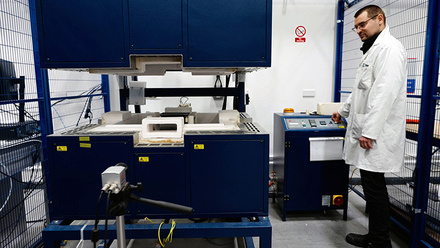A green package?
Amid ongoing conjecture on Extended Producer Responsibility and Deposit Return Scheme legislation in the UK, there was much debate at the Environmental Packaging Summit in Birmingham, UK. Sarah Morgan reports.

'While packaging has a really important role to play in protecting products and providing consumers with important information, it does still have some adverse impacts,' opened Dr Barbara Leach of the UK Department of Environment, Food & Rural Affairs (DEFRA), as she kicked off proceedings at the Environmental Packaging Summit from 13-14 June in Birmingham, UK.
'As a nation and as a sector, we know that we can still do better,' she asserted. 'We’re very much committed to working with all parts of the supply chain on our promises...Working at pace to collectively agree the best approach for [ensuring interoperability of the various government schemes].'
Last December, the UK Government made reducing residual waste a legally binding statutory target. It places a requirement on government to halve the amount of residual waste we produce to 287kg per capita by 2042.
The integrated reforms centre around:
- Updated consistency of waste collection (England only)
- The Deposit Return Scheme (DRS) for drinks containers, of which Scotland will have its own scheme
- Extended Producer Responsibility (EPR) for those firms that supply or import packaging
Regarding the much-debated DRS, she stressed, 'A lot of the expertise lies with you [the industry] and not with us...None of us think this [process] is ideal. We would all like to be introducing the schemes in a logical way.'
She outlined how DEFRA is looking to simplify DRS with a single registration process for sellers, ensuring drinks cups without content can be returned anywhere in the UK and with the possibility of introducing a single DRS logo. The regulation is expected to come into effect in October 2025.
And as the civil servant working on delivering the fees and payments calculator for packaging EPR, she outlined how DEFRA is setting up a cost and performance model called LAPCAP, likely based on four factors that they deem drive local authority costs for packaging waste: plurality, deprivation, residual waste collection frequency and dry recycling scheme type. As this performance model is in the early stages, these four factors are yet to be fleshed out.
She noted there will 'probably' be a provision for identifying collection in high rises/communal buildings.
The EPR provisions only apply to household packaging and impact large packaging producers that have a turnover over £1mln and put over 25t of packaging on the market every year.
There will also be ‘eco-modulation fees’ to incentivise companies that use packaging and put packaged materials onto the market to choose materials with a lower environmental impact. Modulation fees in the first year will be based on the material’s recyclability. Leach suggested this might expand past the first year to wider environmental outcomes. Year one of modulation is 2025, in the second year of the EPR legislation.
Devil in the data
With legislation a hot topic, it is no surprise that the requirements around data for compliance was a theme returned to throughout the two-day event.
George Atkinson, Head of Policy at Valpak, noted that government is seeking to move from a 63% to 78% recycling rate. He sees many data challenges:
- Bi-annual reporting for large producers
- Small producer reporting
- New categories and submission process
- Reporting supply by UK nation
- Eco-modulation by UK recyclability
- Lack of understanding of the reforms
- Lack of awareness of the reforms – some do not know what is coming
- Uncertainty about whom firms need to pay fees to as part
- of EPR
- Uncertainty about when firms need to pay fees
- Uncertainty about the changes overseas, such as the EU
Tim Barbary FIMMM, Director at Benchmark Consulting, stressed, 'The use of broad averages in packaging is misleading…If you want to avoid accusations of greenwashing…you can’t mark your own homework.'
And 'if you cannot accurately measure it, how on earth can you work out if you are doing something right…You’ve got to be granular with data'. He highlighted the bad press the industry receives as an incentive 'to be above' the current standards. Carbon offsetting, while a valuable tool, should be used for extreme circumstances, he added.
But his message from a data standpoint was not all doom and gloom. He said, 'You can save money and carbon at the same time.'
Coca-Cola’s Sam Jones, Head of Climate and Sustainability, also acknowledged it all starts with data. He noted that there is a danger of comfort in ambiguity, and that historical data does not reflect current advances in sustainability goals, which he said can be 'seen as an excuse'.
He continued that leaders need to be comfortable the data is good enough to make decisions based on them, otherwise it is 'just kicking the can down the road'.
Hannah Osmond of Valpak discussed the mandatory cup takeback scheme as part of EPR, which has a data reporting requirement for companies with 10 employees or more. 'These businesses are not going to have had experience of submitting data'. It may encompass small cafés and museums with coffee shops.
Louisa Goodfellow, Policy Advisor at Ecosurety, echoed concerns around 'trying to get the granular packaging data' and 'trying to get the data in on time'. While Andrew McCaffery, CSO at Ecoveritas, said, 'I don’t think the [packaging recovery note] (PRNs) are a good way of data collection'.
Paula Chin, Senior Policy Advisor at WWF, noted lifecycle analysis is problematic. 'What we should be measuring is the same thing.' She fears it is used as a tool to validate rather than inform the packaging choice.
A tale of two veg boxes
Back in 2018, organic food delivery company Abel and Cole made the decision to switch its bag material for carrots and potatoes to compostable film. Last year, however, this decision was reversed, although they continue to keep packaging use to the absolute minimum.
This followed research released by University College London (UCL), UK, which demonstrated there is not currently an appropriate UK waste processing infrastructure to handle compostable material. The UCL team engaged with over 9,500 UK citizens, and 1,648 people performed home compost experiments of compostable plastics.
The researchers revealed that the public are confused about labels for compostable and biodegradable plastics. Of the materials tested under different home composting conditions, the majority did not disintegrate, including 60% of those labelled ‘home compostable’.
'This is probably the primary reason that we chose to move away from it,' said Hugo Lynch, Sustainability Lead at Abel and Cole.
'Simply because we couldn’t give accurate messaging to our customers on how and where to dispose of the material that we provided to them. It isn’t clear even now what the government policy is on this and where we might see investment when it comes to this material.'
Lynch added lifecycle analysis was investigated by UCL and Sheffield’s Grantham Centre and showed 'concerning results' about the amount of time the material takes to break down. These 'challenge the notion we had that this was an inherently better material to use than the available alternatives'.
He also revealed the CO₂ impact was shown to be the same as the conventional plastic, but with additional impact on land, which they could not trace.
Although, 'this is not something we see as a permanent ban', he clarified.
Organic fruit and veg box delivery firm Riverford, on the other hand, has committed to all its packaging being paper-based or compostable, if packaging is needed at all.
The decision was made after assessing kerbside schemes and the ability to recycle flexible plastics at kerbside. Meanwhile, 85% of their customers could compost in their gardens, or the material is collected by their network of farms and suppliers for composting – 150-200t is composted at any one time.
Sixty per cent of packaging is going to effective composting routes, 42% into home composting and 25% to the farm.
Zac Goodall, Head of Sustainability at Riverford, said, 'It absolutely does disappear. The only adjustment that needs to be made is that farmers cannot rush compost through as quickly as they would.' He added that the material breaks down well within the certified 12 months that is stated on the packaging. 'There’s still gaps for us to plug', but he said it worked well.
Collective effort
Another recurring theme was collaboration, bolstered by DEFRA’s plea for industry input on the interoperability of government schemes. The mood among delegates seemed positive, with more than one alluding to like-minded people coming together. However, this general mood of cooperation and good intent was not without its gripes.
John Garner, Head of Sustainability, Innovation and Design at packaging design firm Antalis, emphasised the importance of personal responsibility. 'Every one of us can do better,' he warned. 'If we don’t start making these changes, the customers of tomorrow will not buy your products.' He urged delegates to design for recycling, disassembly and process.
Paul Vanston, Chief Executive of the Industry Council for Packaging and the Environment, noted the current 63% packaging recycling rate is worth celebrating. 'It did not happen by accident,' pointing to the blueprint of previous effort and collaboration by the packaging industry.
However, Vanston was exasperated about the roll-out of legislative changes. 'It really does feel like a white-water rafting ride.' He reiterated the need for smooth, properly sequenced legislation that is 'well designed and well timed', calling on DEFRA to 'revise your timescales'. He also called for the fees from EPR to be put back into the industry.
Margaret Bates FIMMM, Managing Director at On-Pack Recycling Label (OPRL), noted the industry is getting better at partnership, 'but we need to get even better' to solve 'the absolute mess we are in now'. She sees the risk of political and industry silos. With current realities in mind, she concluded one of the Q&As by glibly saying perhaps we need to be using people who can describe the problem more simply to educate everyone on recycling and reuse.
The cost of change
There was no shying away from the issue of money. With Jones lamenting, 'A target without a resource is a dream'. Although he acknowledged pricing climate change will 'drive solutions'.
Atkinson stated businesses are 'looking at in excess of 10 times cost increases', with the PRN fee, contribution to recycling cost and EPR fee obligation.
He touched on one of the headline figures of the event – EPR will have a £1.8bln impact. The concern is that primary packaging, where it is provided indirectly to an end-user, must be treated as household waste and report for EPR fees. 'Even though that packaging won’t ever arise as household packaging waste.' He said, 'I really hope DEFRA go back to the drawing board on [this].' He believes it may force businesses to go through third parties rather than direct delivery as an unintended consequence.
Open Data Standard encompasses all packaging materials
An industry-led Open Data Standard now covers all common packaging materials, including glass, metals, paper, fibre-based composites and wood.
The Open 3P Data Standard was developed initially to support efficient and consistent data capture, sharing and reporting on plastic packaging only.
The Standard may help reduce the administrative burden of Extended Producer Responsibility legislation, as well as facilitate and speed up routine supply-chain data requests.
Firms, he said, can face these cost challenges by:
- Redesigning packaging
- Reusing packaging
- Self-management of packaging waste
- Implement a takeback scheme
- Material switching
Garner wanted companies to bear in mind class actions are also expensive. He concluded sustainable changes, 'may cost a lot less than you think', and urged that if enough people share the same dream, it becomes a movement.
Vanston sombrely noted changes would have an inflationary impact. 'Another £60 per annum (per person) is tangible', especially in the context of the cost-of-living crisis.
Zac Goodall, Head of Sustainability at organic veg box company Riverford, did not shy away from money either. Speaking about the company’s use of compostable packaging (see first box-out above), 'I can answer it very bluntly. Riverford are just accepting there is a higher price on it.'
Hugo Lynch, Sustainability Project Manager of organic food box company Abel and Cole, meanwhile said, 'It’s worth paying the extra cost if you are willing to make cuts elsewhere.'
Maureen Stevenson, Head of Marketing and Business Development at Cullen Packaging, was more measured, saying, 'We can work with clients to bring that cost down'.
Lynch was forthright, saying, 'We need to change consumption behaviour…The perfect material doesn’t exist.'
At the end of the day
Some insightful concluding thoughts came from Clare Shrewsbury, Director, Insights and Innovation at WRAP.
'I think it’s frustrating…but I think the direction of travel is there…We’ve got to think about the citizen and what we’re asking them to do differently.'
Goodfellow felt it is important to, 'Give them a clear indication of what it’s going to cost and where [the money is] going.'
Morgan said in the closing minutes, 'It’s complex', but 'maybe, just maybe, we’re making it too complex'.
See Materials World, February 2023, for articles on Standardising packaging data and Design decisions for Extended Producer Responsibility






